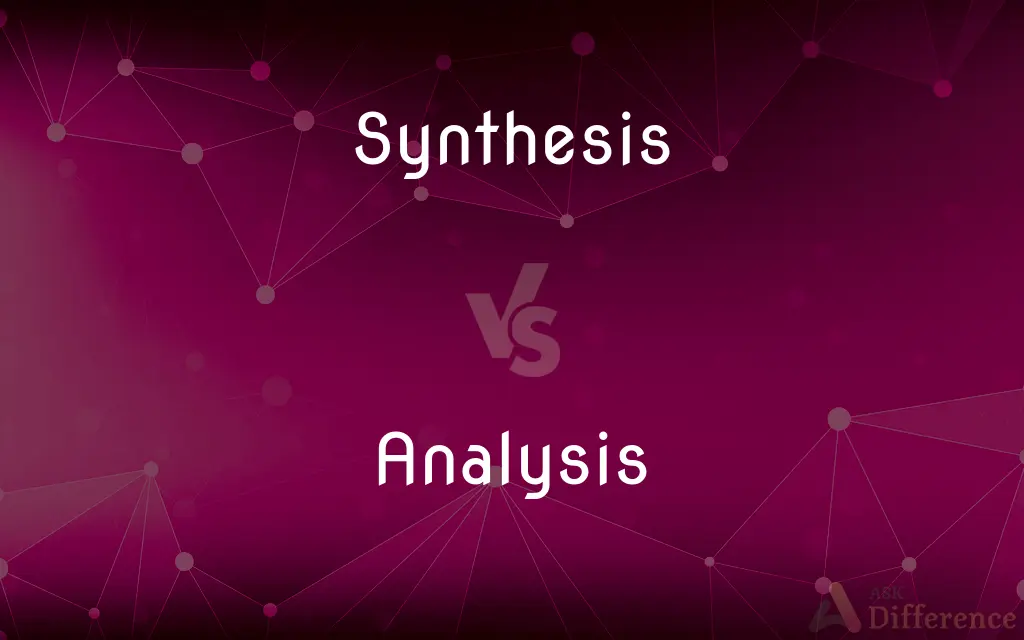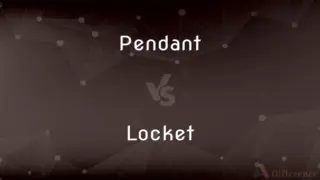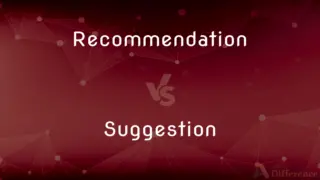Synthesis vs. Analysis — What's the Difference?
By Fiza Rafique & Urooj Arif — Updated on April 24, 2024
Synthesis involves combining ideas or elements to form a coherent whole, often creating new knowledge or structures; analysis, in contrast, refers to breaking down complex data or systems into simpler parts to understand them better.

Difference Between Synthesis and Analysis
Table of Contents
ADVERTISEMENT
Key Differences
Synthesis is the process of integrating various pieces of information, ideas, or materials to construct something new or propose innovative solutions. Analysis, on the other hand, involves dissecting a complex concept, system, or text into smaller, more manageable components to examine how they function individually and together.
In academic writing, synthesis often appears in works that pull together themes or findings from multiple sources to support a new thesis or narrative. Meanwhile, analysis typically focuses on critically evaluating individual sources or data points to draw out deeper insights or uncover underlying patterns.
When solving problems, synthesis might involve the application of combined methodologies to create novel solutions, such as in interdisciplinary research. Analysis is more about understanding the problem deeply through methods like statistical breakdowns or critical examination of each component.
In the context of creativity, synthesis is akin to creating a mosaic from diverse inspirations and influences, producing original art or ideas. Analysis is more like studying the brushstrokes and color schemes of each painting to appreciate or understand the techniques used by different artists.
While synthesis is oriented towards construction and building, analysis is fundamentally about deconstruction and examination, each playing vital roles in the progression of knowledge and innovation in fields ranging from science to humanities.
ADVERTISEMENT
Comparison Chart
Definition
The combination of ideas or parts to form a whole.
The examination of something by separating it into parts.
Purpose
To create or build new structures, theories, or knowledge.
To understand or clarify how things work by looking at components.
Approach
Integrative, constructing, creative.
Dissective, examining, critical.
Outcome
A new synthesis may lead to innovative solutions or new perspectives.
An analysis often results in deeper understanding or refined knowledge.
Usage
Common in fields like synthesis chemistry, writing, art.
Used in scientific research, literary criticism, business analysis.
Compare with Definitions
Synthesis
Merging different theories or data sets to propose a new model.
The study presented a synthesis of existing research on climate change.
Analysis
Critical evaluation of a text to interpret its meaning.
Her analysis of the novel provided insights into its thematic structure.
Synthesis
The art of producing something original from diverse influences.
His artwork is a synthesis of classical and modernist styles.
Analysis
Assessing a business’s financial health through detailed examination of accounts.
The quarterly financial analysis showed an increase in profits.
Synthesis
Combining multiple sources or ideas into a cohesive argument.
Her thesis is a synthesis of historical and contemporary viewpoints.
Analysis
Examining data to uncover trends or patterns.
Data analysis revealed seasonal fluctuations in sales.
Synthesis
Generating novel solutions through the integration of various disciplines.
The project was a synthesis of engineering and design principles.
Analysis
Breaking down a complex process to understand its components.
The team conducted an analysis of the production workflow to identify bottlenecks.
Synthesis
Creating new chemical compounds by combining different elements.
The lab focuses on the synthesis of new bioactive compounds.
Analysis
Using scientific methods to study the properties of a substance.
The lab specializes in the analysis of toxic materials in consumer products.
Synthesis
The combining of separate elements or substances to form a coherent whole.
Analysis
Analysis is the process of breaking a complex topic or substance into smaller parts in order to gain a better understanding of it. The technique has been applied in the study of mathematics and logic since before Aristotle (384–322 B.C.), though analysis as a formal concept is a relatively recent development.The word comes from the Ancient Greek ἀνάλυσις (analysis, "a breaking-up" or "an untying;" from ana- "up, throughout" and lysis "a loosening").
Synthesis
The complex whole so formed.
Analysis
Detailed examination of the elements or structure of something
Statistical analysis
An analysis of popular culture
Synthesis
(Chemistry) Formation of a compound from simpler compounds or elements.
Analysis
Short for psychoanalysis
Other schools of analysis have evolved out of the original disciplines established by Freud
Synthesis
Reasoning from the general to the particular; logical deduction.
Analysis
The separation of an intellectual or material whole into its constituent parts for individual study.
Synthesis
The combination of thesis and antithesis in the Hegelian dialectical process whereby a new and higher level of truth is produced.
Analysis
The study of such constituent parts and their interrelationships in making up a whole.
Synthesis
The formation of something complex or coherent by combining simpler things.
Analysis
A spoken or written presentation of such study
Published an analysis of poetic meter.
Synthesis
(signal processing) Creation of a complex waveform by summation of simpler waveforms.
Analysis
The separation of a substance into its constituent elements to determine either their nature (qualitative analysis) or their proportions (quantitative analysis).
Synthesis
(chemistry) The reaction of elements or compounds to form more complex compounds.
Analysis
The stated findings of such a separation or determination.
Synthesis
(logic) A deduction from the general to the particular.
Analysis
A branch of mathematics principally involving differential and integral calculus, sequences, and series and concerned with limits and convergence.
Synthesis
(philosophy) The combination of thesis and antithesis.
Analysis
The method of proof in which a known truth is sought as a consequence of a series of deductions from that which is the thing to be proved.
Synthesis
(military) In intelligence usage, the examining and combining of processed information with other information and intelligence for final interpretation.
Analysis
(Linguistics) The use of function words such as prepositions, pronouns, or auxiliary verbs instead of inflectional endings to express a grammatical relationship; for example, the cover of the dictionary instead of the dictionary's cover.
Synthesis
(rhetoric) An apt arrangement of elements of a text, especially for euphony.
Analysis
Psychoanalysis.
Synthesis
(grammar) The uniting of ideas into a sentence.
Analysis
Systems analysis.
Synthesis
(medicine) The reunion of parts that have been divided.
Analysis
(countable) Decomposition into components in order to study (a complex thing, concept, theory etc.).
Synthesis
Composition, or the putting of two or more things together, as in compounding medicines.
Analysis
(countable) The result of such a process.
Synthesis
The art or process of making a compound by putting the ingredients together, as contrasted with analysis; thus, water is made by synthesis from hydrogen and oxygen; hence, specifically, the building up of complex compounds by special reactions, whereby their component radicals are so grouped that the resulting substances are identical in every respect with the natural articles when such occur; thus, artificial alcohol, urea, indigo blue, alizarin, etc., are made by synthesis.
Analysis
The mathematical study of functions, sequences, series, limits, derivatives and integrals.
Mathematical analysis
Synthesis
The combination of separate elements of thought into a whole, as of simple into complex conceptions, species into genera, individual propositions into systems; - the opposite of analysis.
Analysis and synthesis, though commonly treated as two different methods, are, if properly understood, only the two necessary parts of the same method. Each is the relative and correlative of the other.
Analysis
Proof by deduction from known truths.
Synthesis
The process of producing a chemical compound (usually by the union of simpler chemical compounds)
Analysis
The process of breaking down a substance into its constituent parts, or the result of this process.
Synthesis
The combination of ideas into a complex whole
Analysis
The analytical study of melodies, harmonies, sequences, repetitions, variations, quotations, juxtapositions, and surprises.
Synthesis
Reasoning from the general to the particular (or from cause to effect)
Analysis
Psychoanalysis.
Analysis
A resolution of anything, whether an object of the senses or of the intellect, into its constituent or original elements; an examination of the component parts of a subject, each separately, as the words which compose a sentence, the tones of a tune, or the simple propositions which enter into an argument. It is opposed to synthesis.
Analysis
The separation of a compound substance, by chemical processes, into its constituents, with a view to ascertain either (a) what elements it contains, or (b) how much of each element is present. The former is called qualitative, and the latter quantitative analysis.
Analysis
The tracing of things to their source, and the resolving of knowledge into its original principles.
Analysis
The resolving of problems by reducing the conditions that are in them to equations.
Analysis
A syllabus, or table of the principal heads of a discourse, disposed in their natural order.
Analysis
The process of ascertaining the name of a species, or its place in a system of classification, by means of an analytical table or key.
Analysis
An investigation of the component parts of a whole and their relations in making up the whole
Analysis
The abstract separation of a whole into its constituent parts in order to study the parts and their relations
Analysis
A form of literary criticism in which the structure of a piece of writing is analyzed
Analysis
The use of closed-class words instead of inflections: e.g., `the father of the bride' instead of `the bride's father'
Analysis
A branch of mathematics involving calculus and the theory of limits; sequences and series and integration and differentiation
Analysis
A set of techniques for exploring underlying motives and a method of treating various mental disorders; based on the theories of Sigmund Freud;
His physician recommended psychoanalysis
Common Curiosities
What skills are important for effective synthesis?
Critical thinking, creativity, and the ability to see connections between seemingly unrelated ideas are crucial for synthesis.
What is the main goal of synthesis?
The main goal of synthesis is to combine elements to create something new, whether it's knowledge, solutions, or materials.
Can synthesis and analysis be used together?
Yes, they often complement each other, especially in research and learning processes, where analysis might precede synthesis.
What are common methods of analysis in business?
Common methods include financial ratio analysis, market trend analysis, and competitor analysis.
How does analysis differ from synthesis?
Analysis involves breaking something down into its components to understand it better, while synthesis involves combining components to build something new.
What skills are crucial for effective analysis?
Attention to detail, critical thinking, and systematic thinking are key for performing thorough analysis.
Why is analysis important in academic studies?
Analysis helps students and researchers understand texts, theories, and data deeply, fostering critical engagement with the material.
How does synthesis benefit the creative process?
In creativity, synthesis allows artists to blend various styles and influences to create original works that might inspire new trends or movements.
Is synthesis more subjective than analysis?
Synthesis can be more subjective as it often involves personal insight to combine elements creatively, while analysis tends to be more objective and systematic.
How is synthesis applied in science?
In science, synthesis is used to create new compounds, develop theories, or combine findings from different studies.
Share Your Discovery

Previous Comparison
Pendant vs. Locket
Next Comparison
Recommendation vs. SuggestionAuthor Spotlight
Written by
Fiza RafiqueFiza Rafique is a skilled content writer at AskDifference.com, where she meticulously refines and enhances written pieces. Drawing from her vast editorial expertise, Fiza ensures clarity, accuracy, and precision in every article. Passionate about language, she continually seeks to elevate the quality of content for readers worldwide.
Co-written by
Urooj ArifUrooj is a skilled content writer at Ask Difference, known for her exceptional ability to simplify complex topics into engaging and informative content. With a passion for research and a flair for clear, concise writing, she consistently delivers articles that resonate with our diverse audience.
















































